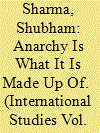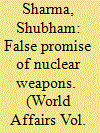| Srl | Item |
| 1 |
ID:
188818


|
|
|
|
|
| Summary/Abstract |
In this article, I attempt to critically assess Kenneth Waltz’s deployment of the idea of anarchy to erect a ‘scientific theory of international politics’. First, I argue that the formation of a concept requires comprehension of the object from the standpoint of historical development, not a narrow reading of it. Second, I subject the thinner abstractions of self-help, balance of power and bandwagoning to the test of history. Third, I argue about mainstream international relations’ disdain for revolutions. I would posit that revolutions are fine templates which store rich agential history of structural transformation, a theme subject to much chagrin by realists of all hues, particularly neorealists. In doing so, I take the Bolshevik Revolution of 1917 as my benchmark. I elucidate that through the occlusion of first and second images, man and state, in the favour of third image, that is, structural anarchy, Waltz tends to ignore the role of agency as a conscious collective which could be best captured by the Bolshevik Revolution. In doing so, I rely on Perry Anderson’s three modes of agency in history. As a corrective to Waltz’s theorization, I make a strong case for class transcending both man and state as an organic category with immense potential of becoming a level of analysis which both acts upon the structure and refracts through it. I finally conclude by saying that anarchy was a condition and not a ‘social relation’ of any sort which could claim to constitute the ‘international’.
|
|
|
|
|
|
|
|
|
|
|
|
|
|
|
|
| 2 |
ID:
152424


|
|
|
|
|
| Summary/Abstract |
Shubham Sharma argues that the nuclearisation of South Asia has deprived India of its territorial, demographic and conventional edge over Pakistan. Moreover, through the Nuclear Deal with the US, India has sacrificed some of its strategic autonomy while remaining vulnerable to Pakistani and Chinese hostility. On balance the pursuit of a nuclear deterrent has brought more losses than gains.
|
|
|
|
|
|
|
|
|
|
|
|
|
|
|
|